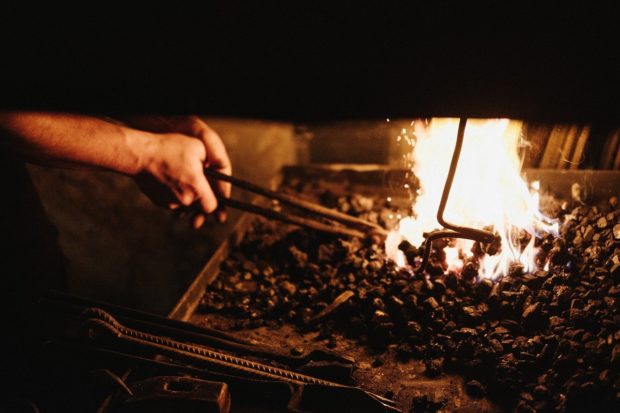You have no items in your cart. Want to get some nice things?
Go shopping
for Daniel Hawker, a smith.
The smithy at Lea was a squat building made of stones piled on top of one another without much apparent care. Inside I saw a jumble of tools and equipment and half-finished creations propped against a long bench. Ranks of horseshoes hung on a wall near a grimy window, and at the far end was the forge with a hood and chimney above. The place had a sour smell of coke and the quality of someone being there even though it was empty.
‘Anyone home?’ I said. I’d been travelling for a month in the late summer heat and the trip to Lea was the last on my itinerary. I was tired and ready to make my way home before term began and I would have to return to my teaching post. I pushed my fingers into a box of nails on the bench to feel the cold prickle against my skin and a shadow crossed the doorway.
‘What knavene?’ The deep voice startled me. I jumped and the nails fell to the floor.
‘I’m sorry.’ I sunk to my knees to clear up the mess. The smith didn’t move to stop me or to make me feel any more at ease but watched from above as I attempted to gather the escaped nails into their box.
‘You looking for something?’
‘I was looking for you, I think,’ I said. ‘My name is Matthew Thomas.’ From my position I saw his strong boots and the leather chaps laced around his legs. ‘My friend said to ask for the burnwater.’ I stood and placed the nails back on the bench.
‘You need something smithing?’ He bent to pick up a nail I’d missed and reached past me to put it in the box. ‘Here shankes ben shackeled for the fere-flunderes.’
‘No,’ I said, not understanding all of what he said.
‘Thought not.’ He moved to the forge and stoked it, sending sparks up the chimney. I watched as he took a piece of metal and measured it against the broken end of a garden hoe. As my eyes adjusted to the light, I saw that he was younger than I’d imagined. Perhaps thirty or so and with barley coloured hair and pale eyes. Despite the smithy looking as though it had grown out of the cliff behind it, neither he nor the place itself seemed like it belonged in Lea.
‘I don’t want to disturb you,’ I said.
‘And yet here you are. Drive me to deth with den of here dintes.’
‘I’m sorry. You’re busy, I know, but I was given your name by a friend of mine, John Stephens. He came visiting here last year collecting songs.’ The smith pumped the bellows by the forge and the fire within grew hotter and brighter. ‘He told me that you were the one to ask.’
‘Huf, puf, saith that on.’
‘He also told me that you wouldn’t sing for him,’ I said lightly. John had been to Lea with our friend Howells and had gathered songs from other people in the village, but the blacksmith had been unforthcoming.
‘Haf, paf, that other.’
‘I was hoping I’d have a bit more luck,’ I said, without believing that I would.
‘The maistre longeth a litil.’ The heat was thick and stifling and a metallic tang stuck in the back of my throat.
‘Perhaps my friend didn’t explain what we’re trying to do,’ I said. ‘Times are changing and we’re afraid that there won’t be anyone around who knows the old songs anymore. You’d be helping to preserve the past.’ He took the metal from the heat with a pair of tongs and placed it on the anvil directly in front of me. Alarmed, I took a large step back into a pile of bars, banging my heel on the lengths of iron yet to be shaped. He beat the metal with rhythmic, syncopated blows.
‘Iron sings. Stark strokes they striken on a steled stock.’ The clang of the hammer bounced off the walls and I could feel the sound through the soles of my shoes. He stopped and measured the metal again against the broken end of the hoe he was repairing.
‘But you don’t?’ I asked. ‘Sing, I mean.’ He looked at me for a moment before carrying on, putting the metal back into the heat then beating it once more with his hammer. ‘I want to save music for the future.’ I realised how grand and ridiculous it sounded and wondered what all these people must think of me and my mission. He cooled his work in a trough of water, steam pluming around him. ‘I think it’s important,’ I said.
‘This hoe is important. Hevy hameres they han that hard ben handled.’
‘I’m sure it is.’ I leaned back against the long bench and he placed the still hot piece of iron at the end of pole.
‘Without this the weeds will choke the plants. Twineth hem twein.’
‘It’s a constant battle,’ I said weakly, seeing in my mind’s eye my father stooped over the vegetable patch. The smith put down the hoe and wiped his hands before crossing the floor and standing before me as though keen to deal with me and have done with it.
‘What do you want?’ He looked me in the eyes. Lit only by the daylight coming through the square of filthy window and the dull red glow of the fire, the forge was a cave and he a dragon. ‘Stark strokes toucheth a treble.’
‘Like I said, I’m collecting songs,’ I said.
‘Ne herd men never. What do you do with them?’ Others had asked the same question with scorn, but I couldn’t fathom the inscrutable expression on the smith’s face.
‘I’m a composer. I arrange the songs for others to sing,’ I said. My hands were clammy and I wanted to go outside. ‘I make other pieces out of them too. For orchestras and so on.’ My back itched with the heat and intensity.
He nodded slowly. ‘Blowen here bellewes. Spellen many spelles.’ The smith lifted his chin to look down on me and I felt uncomfortably young, like I was thirteen years old and encountering an older boy with knowledge unavailable to me. He took a hammer from the bench beside me and I felt his hot breath on my neck.
‘I’ve a pony to see. Lasheth a lesse.’ He put the hammer and nails on the anvil then turned to leave. I followed him out into the daylight, blinking and surprised by the relative coolness of the air.
‘Don’t people usually bring their horses to you?’ I asked.
‘Rowten by rowe.’
We walked a little way down the hill and in the dappled light beneath the trees I could see a smattering of burn marks and scars across his arms. He walked strangely, with one knee straightened and his ankle turned out. We crossed a style into a field and stood by the wall. Nettle stings bloomed across the backs of my hands and my pack felt heavier than it had been when I set off from my camp that morning. I was beginning to think it had been a wasted trip and that trailing after a blacksmith for an unknown song was a fool’s errand.
The smith whistled and I heard the hooves of the pony as it cantered over from the stream at the far end of the meadow. It was a dark little creature, fit only for a child or a trap, but she brought a smile to the smith’s face as she dipped her head into his hands.
‘Is she yours?’ I asked.
‘Christ hem give. This one belongs to herself.’
We took the longer way back through the field gate after he’d put a halter on her. Swallows were diving all around us, catching invisible midges, and a group of young women in the distance were making their way home as the sun began to dip. As I followed him back, he spoke softly to the animal.
‘Lus, bus, las, das.’
By the time we arrived at the smithy, her ears were soft and she had a sleepiness which I too felt. Putting my pack down, I went over to the little pony’s head and smoothed her velvety nose.
‘Make sure she stays put.’ She had a warm, malty smell and was unconcerned by the smith’s steady work at her feet. He used nippers, clenchers, rasps and files, switching from one to another with a conjurer’s deftness. ‘Tik, tak, hic, hac, tiket, taket, tik, tak.’ His back was sickle shaped and strong and as he moved around the pony, I saw the tide of soot and sweat at the top of his collar. Though he worked swiftly, I was getting hungry and thirsty and wanted to rest. I was giving up any hope of the man singing for me.
‘Do you know somewhere I can stay?’ I asked when he stood straight, stretching his arms above his head. ‘It’s getting late.’ He smoothed his hand along the pony’s neck to her withers and she shivered and shifted her weight.
‘Stay with me and holden hem hote with here hard hamers.’ He led the pony into the stable and put out hay and water for her then went back into the smithy.
‘I wasn’t angling for an invitation,’ I said from the doorway, flustered and not wanting to go back inside. I heard him moving tools and tidying things away. I would have to make camp somewhere sheltered, perhaps down by the brook where the pony had been grazing. In the morning, I would return home without that which I’d come for.
‘Stay.’ The command came like a blow as his whole frame filled the doorway. ‘May no man for brenwateres on night han his rest.’ I lost my breath for a second but then understood. I reached out and touched his scarred arm.
‘Will you sing for me if I do?’ I asked. But the burnwater held an irresistible power over me. There would be no bargain and I would be with the smith that night in a way that my friend John never would. He picked up my pack and shouldered it with ease and without argument, I followed him past the smithy and up to his home near the trees.
Inside he brought me tea and a meal of hazelnuts, potato cakes and white cheese. We shared it silently by the fire while the empty nutshells snapped and squealed in the flames. He washed in hot water from the black kettle, spraying drops which hissed on the coals and pooled on the hearth. Later, I lay shirtless in his low bed and in the dim light I watched as he released the buckles of his chaps which clinked like glockenspiel.
Through the night the blacksmith gave me his song and I knew I would not write it down nor share it with the world. The whistle which made the pony come running would die with me. The rasp and scrape of tools as he shod her would lodge in my skin. The sigh of air through the bellows would live in my lungs. Mine was the yield of iron beneath his blows and the skitter of nails across the dirt. So too the smooth slap of his leather apron and the crunch of his feet on the cinder path. The snip of the latch on the door as it closed behind us.
Gnawen and gnacchen. Groan togedire. Swich nois on nightes ne herd men never.
Footnote: The Blacksmiths or A Satire on the Blacksmiths, is a 15th century poem by an anonymous author which can be found in British Library MS Arundel 292.

About Elin Heron
- Web |
- More Posts(1)




